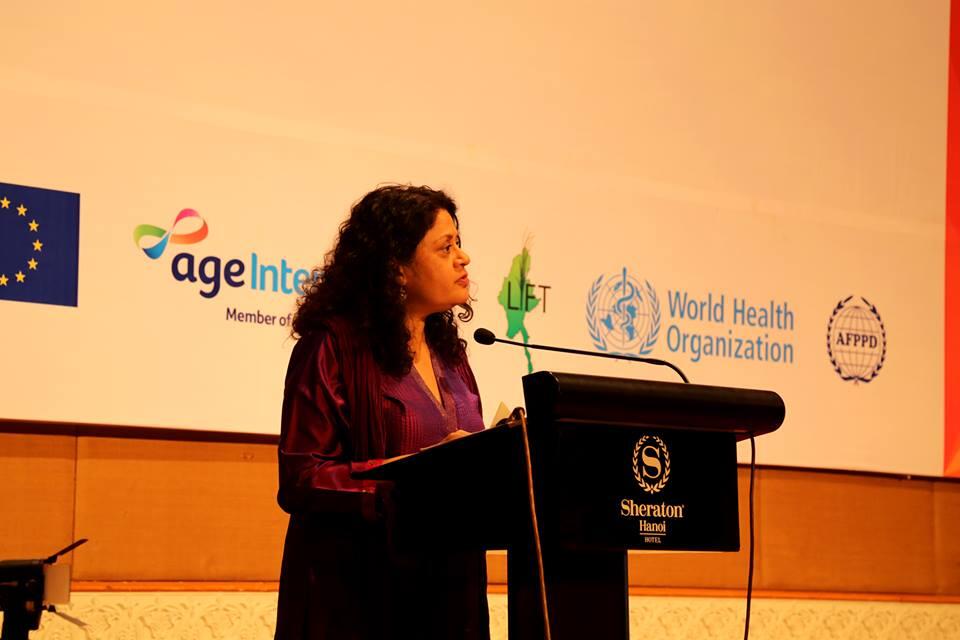Your Excellency Mr. Vu Duc Dam, Deputy Prime Minister of the Socialist Republic of Viet Nam, Chairman of the National Committee on Ageing.
Your Excellency Mr. Dao Ngoc Dung, Minister of Labour, Invalids and Social Affairs/ Vice Chair of Viet Nam National Committee on Ageing;
Your Excellency Mr Nguyen Trong Dam, Vice Minister of Labour, Invalids and Social Affairs;
Mr. Eduardo Klien, Regional Director, HelpAge International;
Representatives from MOLISA, Government agencies, research institutes; CSOs, Donor Agencies, private sector and international and local NGOs;
UN colleagues and media;
Ladies and Gentlemen,
Good morning.
It is a pleasure to represent the United Nations Population Fund, UNFPA, here today at the start of this important conference on a crucial theme for our region, and indeed globally: The economic implications of ageing.
The issue of ageing populations in Asia and the Pacific is not a new theme. Many of us have worked on this for quite a while now – governments, HelpAge and other civil society organisations, UNFPA and other partners.
But, more than ever, we need to work even more closely together to address a rapidly shifting demographic landscape – to strategise on how to tackle the challenges as well as harness the opportunities inherent in this complex scenario.
Women currently constitute the majority – some 54 per cent – of older persons in Asia-Pacific. But they represent an even greater majority, 61 per cent, of the “oldest old” population of 80 years and older.
Increasing longevity, of course, is one of humanity’s greatest achievements. It is a triumph of social, economic and technological development for our region that, in the not too distant past, presented a very different picture of life expectancy.
But at the same time, in more and more countries, population growth is slowing.
With better access to health care and education services, resulting in fewer maternal deaths and higher rates of child survival, couples are choosing to have fewer children than before.
Family structures are also changing as the demographic transition along with rapid urbanization and migration impacts the traditional family support system in this region. In the coming decades, the demographic landscape of countries like China and Thailand, for example, will resemble that of Japan, the Republic of Korea, Singapore and several countries in Europe.
This scenario poses challenges. But it also offers opportunities. The choices made today will help shape the countries we will have 30 or 40 years from now.
It is, of course, a challenge for governments to formulate and apply public policies to support people across different age groups, including older persons -- and all the more so when population dynamics shift rapidly.
Governments and policy-makers tend to focus on the costs of addressing population ageing -- costs related to the increased demand for health services, long-term care, social protection and pensions. But we require a different political and socio-economic mindset, one that turns challenges on their head and sees the very real opportunities arising from an ageing population.
Older people actually make enormously important contributions to their families, communities and the workforce. Ensuring that they are able to remain socially and economically active, secure and healthy as they age is not just the right thing to do, it’s the smart thing to do – for economies and societies.
Some countries have already been implementing or are beginning to implement policies that will help achieve this. But all countries really need to do so – if economic and social gains are to be achieved, strengthened and sustained in the long term.
At UNFPA, we work closely with governments to help develop policies that respond to population ageing and meet the needs of older persons, particularly the most vulnerable and especially women. Strengthening capacity for data collection and analysis is a critical component of this work.
In this, our main partner in this effort is HelpAge - a trusted and valued partnership that spans many decades. UNFPA is proud to join hands with HelpAge as part of the global movement for protecting the rights of older people. HelpAge has long been at the forefront of these efforts – UNFPA salutes you for leading the way.
As far back as 1994, the ICPD Programme of Action recognized the importance of preparing for an ageing world. That commitment was strongly reinforced by the 2002 Madrid International Plan of Action on Ageing, and by governments in this region at the 2013 Asian and Pacific Population Conference in Bangkok.
Next year marks the third review of the Madrid Plan of Action, to examine progress made in realizing the human rights of older persons – including the right to live with dignity and security, to enjoy access to essential health and social services and a minimum income to maintain independence, prevent poverty and age healthfully.
Ensuring an inclusive society and progress in the implementation of the Madrid Plan of Action is critical to realizing the aspirations of the 2030 Sustainable Development Agenda with its central pledge of truly leaving no one behind.
In this, our region has the potential to be a leader – let us work together to ensure success now, and in the future. We congratulate and thank HelpAge for its leadership in bringing us all together here today, and for inspiring us to work collectively to reap the benefits of a longevity dividend for society as a whole.
UNFPA wishes all of you successful deliberations here in Hanoi this week, and looks forward to working with all of you in the years ahead.


